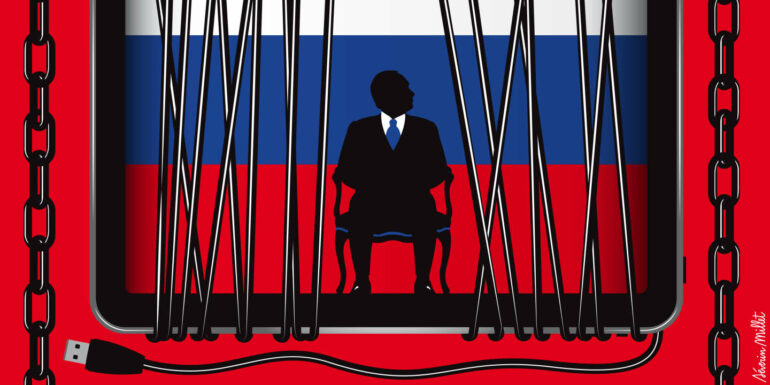Since the start of Russia’s war on Ukraine in late February 2022, Russian internet users have experienced what has been dubbed the descent of a “digital iron curtain.”
Russian authorities blocked access to all major opposition news sites, as well as Facebook, Instagram and Twitter. Under the new draconian laws purporting to combat fake news about the Russian-Ukrainian war, internet users have faced administrative and criminal charges for allegedly spreading online disinformation about Russia’s actions in Ukraine. Most Western technology companies, from Airbnb to Apple, have stopped or limited their Russian operations as part of the broader corporate exodus from the country.
Many Russians downloaded virtual private network software to try to access blocked sites and services in the first weeks of the war. By late April, 23% of Russian internet users reported using VPNs with varying regularity. The state media watchdog, Roskomnadzor, has been blocking VPNs to prevent people from bypassing government censorship and stepped up its efforts in June 2022.
Although the speed and scale of the wartime internet crackdown are unprecedented, its legal, technical and rhetorical foundations were put in place during the preceding decade under the banner of digital sovereignty.
Digital sovereignty for nations is the exercise of state power within national borders over digital processes like the flow of online data and content, surveillance and privacy, and the production of digital technologies. Under authoritarian regimes like today’s Russia, digital sovereignty often serves as a veil for stymieing domestic dissent.
Digital sovereignty pioneer
Russia has advocated upholding state sovereignty over information and telecommunications since the early 1990s. In the aftermath of the Cold War, a weakened Russia could no longer compete with the U.S. economically, technologically or militarily. Instead, Russian leaders sought to curtail the emergent U.S. global dominance and hold on to Russia’s great power status.
They did so by promoting the preeminence of state sovereignty as a foundational principle of international order. In the 2000s, seeking to project its great power resurgence, Moscow joined forces with Beijing to spearhead the global movement for internet sovereignty.
Despite its decades-long advocacy of digital sovereignty on the world stage, the Kremlin didn’t begin enforcing state power over its domestic cyberspace until the early 2010s. From late 2011 to mid-2012, Russia saw the largest series of anti-government rallies in its post-Soviet history to protest Vladimir Putin’s third presidential run and fraudulent parliamentary elections. As in the anti-authoritarian uprisings in the Middle East known as the Arab Spring, the internet served as a critical instrument in organizing and coordinating the Russian protests.
Following Putin’s return to the presidency in March 2012, the Kremlin turned its attention to controlling…



